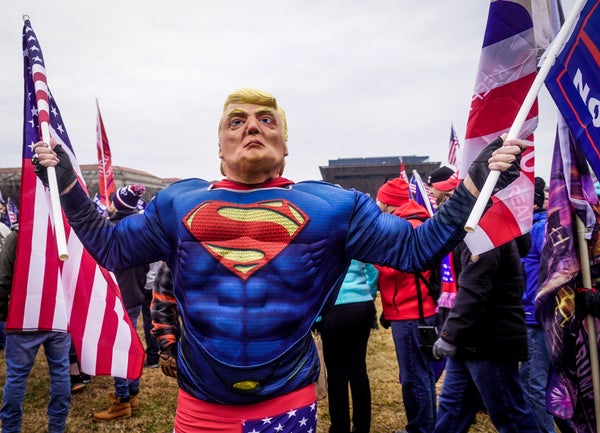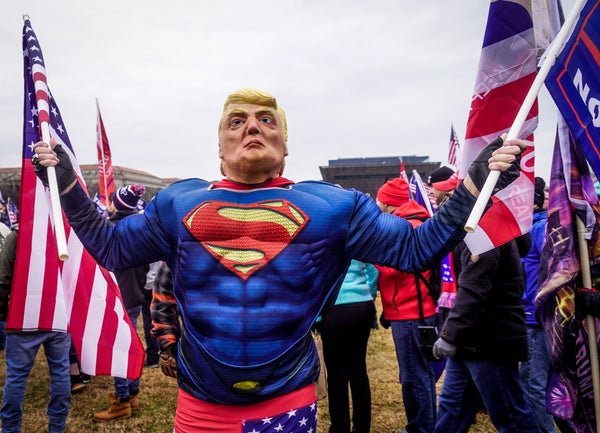Trump’s Personality Cult Plays a Part in His Political Appeal
Personality measures suggest Donald Trump exerts a cult of personality over his followers, people who are psychologically susceptible to his appeal. This could help explain how he has succeeded in U.S. politics while other populists have not

Trump supporters near the US Capitol following a “Stop the Steal” rally on January 06, 2021 in Washington, DC. The protesters stormed the historic building, breaking windows and clashing with police.
Selcuk Acar/NurPhoto via Getty Images
Donald Trump is now leading in many polls and could retake the U.S. presidency, despite numerous scandals, indictments and erratic behavior. Explanations for his popularity focus on factors like white identity, right-wing authoritarianism, nationalism and populism.
U.S. politics has included people with these predilections for many decades, however, so the puzzle of Trump’s appeal remains. Other U.S. politicians, such as Pat Buchanan, David Duke and Ross Perot, previously tried to tap into these discontented outlooks with limited success. We have also seen unsuccessful attempts to provide a more refined version of Trumpism, notably from Florida governor Ron DeSantis. What is different about Trump that has allowed him such success where others have failed?
Support from a “personality cult”—something his would-be successors lack—has, we believe, been essential for Trump’s political success. In new research, we argue that there is an identifiable hard core of extremely loyal Trump supporters that comprise his personality cult. Members of such a cult show unquestioning loyalty to a strong leader, such as Argentina’s Juan and Eva Perón or Italy’s Benito Mussolini, whom they perceive as infallible and truthful. Their devotion has religious parallels as they consider their leader a savior with unique ability to protect society against internal or external threats. Trump has himself embraced such a status in relation to his followers in statements such as “I am your voice” and “I alone can fix it,” both of which he declared at the 2016 Republican convention.
On supporting science journalism
If you’re enjoying this article, consider supporting our award-winning journalism by subscribing. By purchasing a subscription you are helping to ensure the future of impactful stories about the discoveries and ideas shaping our world today.
Trump’s followers are often referred to as a personality cult. Republican former representative Liz Cheney lamented that her party had “embraced Donald Trump [and] embraced his cult of personality” after her 2022 defeat by a Trump-backed candidate. Mainstream news media often refer to the idea of a personality cult in connection with Trump, but until now there has been little discussion of the idea by political scientists.
Personality cults are commonly associated with authoritarian systems, where a strong leader sits atop a regime with strict control of public information. It may therefore seem surprising to find this level of loyalty to a former president in the U.S. However, we identify a group of cultlike Trump followers by their loyalty and personality characteristics. We suggest that commanding such a personality cult lets Trump succeed, where other U.S. right-wing populists fail.
Here’s how. We collected data from two nationwide surveys of U.S. adults in 2021 and 2016, with 1,083 and 4,270 respondents, respectively. We differentiated the most loyal Trump supporters from the rest of the American population, including those who merely voted for Trump and supported his policies, by measuring three aspects of Trump support: unquestioning credulity, exemplified by the belief that he was in fact the legitimate winner of the 2020 election; belief in Trump’s leadership abilities; and belief in his elevated stature—a status frequently disrespected by the mainstream media. Strong Trump supporters comprise around 10 and 6 percent of the people in the two studies, respectively 33 and 13 percent of all Republicans.
To measure their personalities, we employed psychologists’ “Big Five” personality dimensions: agreeableness, conscientiousness, extraversion, neuroticism and openness (or open-mindedness). Positions along these five dimensions predict political behavior well, even rivaling education and income as predictors. We asked whether Trump’s most loyal supporters share personality traits and to what extent these are traits one might expect to find among cult members.
Most strikingly, we find they are highly conscientious, a measure of self-reported characteristics including carefulness, dependability, orderliness and self-discipline. Conscientiousness is significantly associated with all the three cultlike aspects of Trump support. High conscientiousness appears in those believing that the 2020 election was “stolen,” in Trump’s outstanding leadership abilities and in his high status among other U.S. presidents.
It is particularly on the self-discipline facet of conscientiousness (self-reported qualities of being focused, reliable, hard-working, and persevering), not the order facet (high self-reported qualities of being careful and organized), where these Trump supporters get distinctly high scores. Here we see a difference between Trump loyalists and conservatives, as conservatism is associated with the order facet only, according to the most recent research. High self-discipline is found also in Trump loyalists who do not identify as conservative or Republican. Other Trump supporters do not share these personality characteristics of his most loyal supporters.
With a view of Trump supporters as a personality cult, it is not surprising that they possess self-images that include a high level of self-discipline. Cult members show stable, disciplined loyalty to their leader and their cult. The opportunity to follow a strong leader provides followers with pronouncements, actions and beliefs to which they can adhere in a disciplined way. While conservatives value social stability and order, cult members can favor destabilizing acts like the storming of the U.S. Capitol.
What does this mean for U.S. politics? Devoted support for Trump demonstrates how political behavior need not be based on policy preferences or ideology. It might instead be motivated by psychological needs found in individuals seeking the guidance of strong leadership. Loyal Trump supporters put their faith in a strong leader they believe can effectively solve problems and save their country from internal and external threats. They find assurance in a leader boasting “I alone can fix it.”
We suggest Trump’s political success springs from this psychological wellspring. His cult enables him to shape conservative news coverage, since his followers are among its most avid consumers and will move away from voices critical of Trump. Trump’s cult also enables him to effectively wield endorsements in primaries to either uplift or defeat other Republicans, based on their fealty. This helped him shape the GOP field in the 2022 midterms through over 200 endorsements. Numerous other U.S. politicians have also adopted positions from protectionism to anti-Washington populism and white nationalism, but it is not these policies that are the key to Trump’s success. We contend that Trump has what others have lacked: a highly loyal and motivated base of supporters—his personality cult.
This is an opinion and analysis article, and the views expressed by the author or authors are not necessarily those of Scientific American.
Source link




